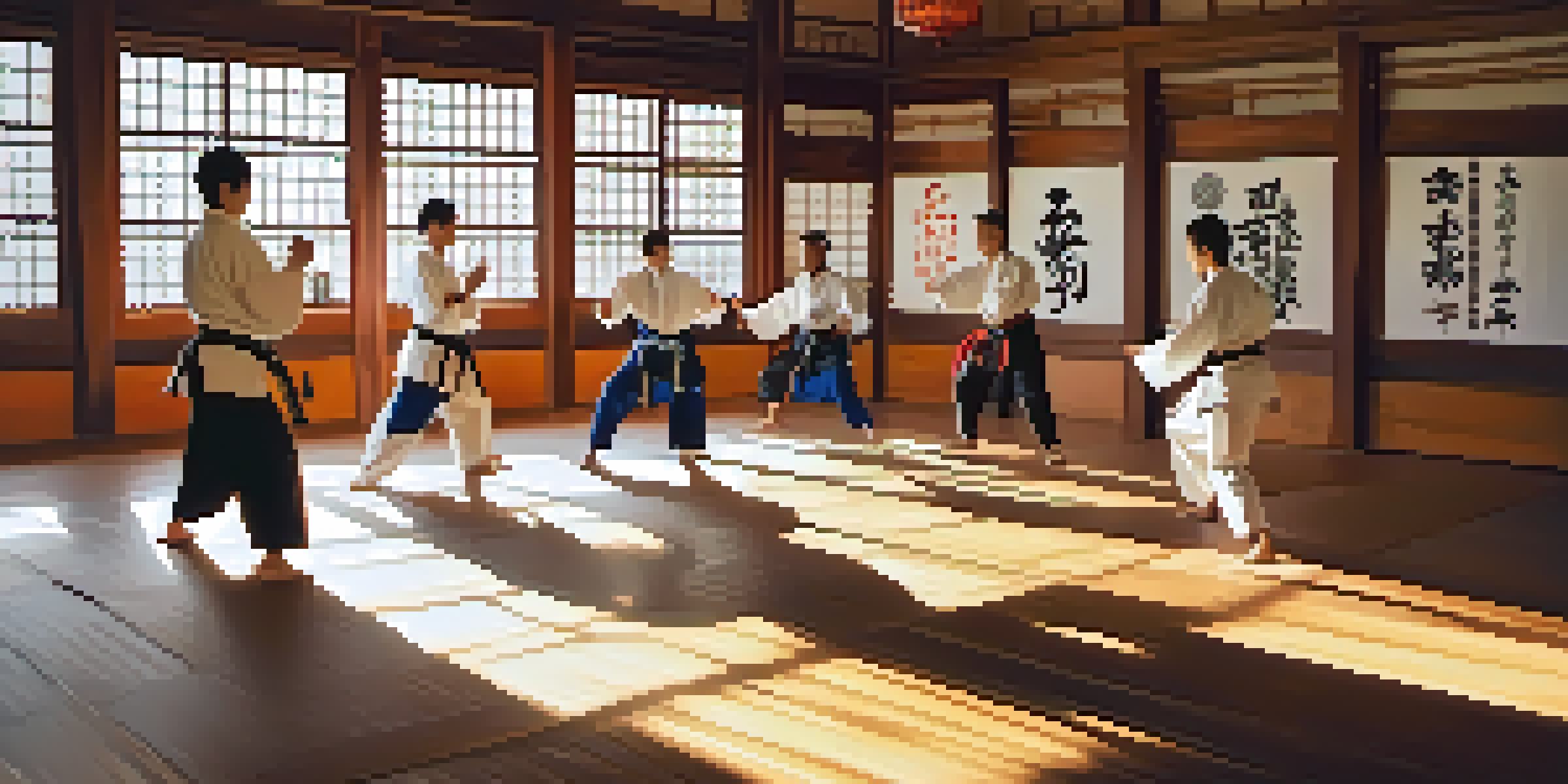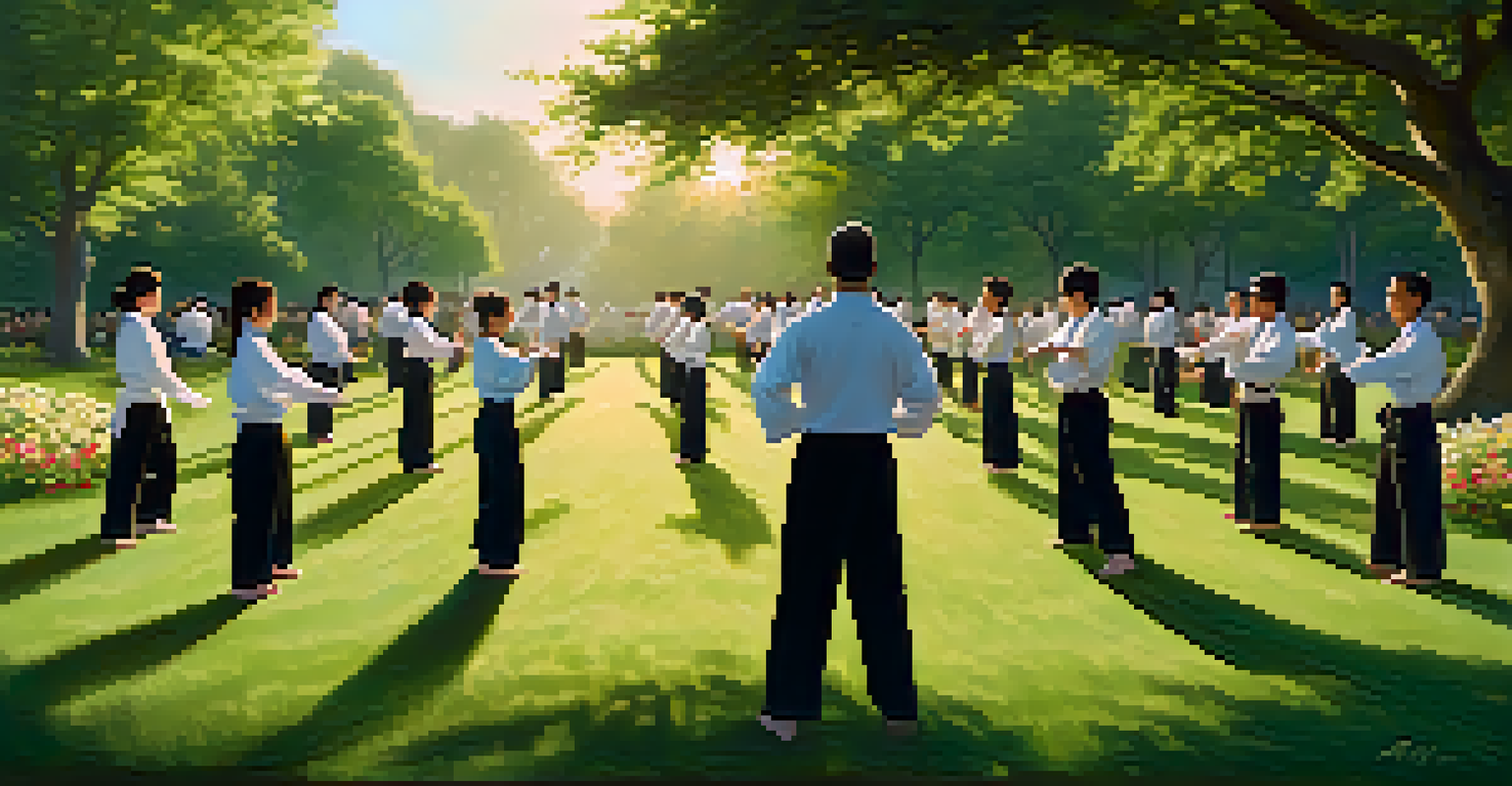Mental Health Benefits of Martial Arts in Rehabilitation

Understanding Mental Health in Rehabilitation
Mental health plays a crucial role in rehabilitation, influencing recovery outcomes. When individuals face physical challenges, their emotional wellbeing can suffer, leading to anxiety or depression. Understanding this connection helps highlight the importance of addressing mental health alongside physical recovery.
The greatest weapon against stress is our ability to choose one thought over another.
In rehabilitation settings, mental health needs can often be overlooked. However, integrating mental health support can significantly improve patient engagement and motivation. This holistic approach encourages a more comprehensive healing process, ultimately aiding faster recovery.
By prioritizing mental health in rehabilitation, individuals can develop better coping strategies. These strategies not only help in overcoming challenges but also promote resilience against future setbacks. This understanding sets the stage for exploring effective therapies, such as martial arts.
How Martial Arts Promote Emotional Wellbeing
Martial arts offer a unique blend of physical activity and mental discipline. The practice involves not just physical movements but also mindfulness, which can greatly enhance emotional wellbeing. This combination allows individuals to channel stress and anxiety into focused training sessions.

Additionally, the structured nature of martial arts fosters a sense of achievement. As practitioners learn new techniques and progress in their skills, they gain confidence and a sense of purpose. This boost in self-esteem can be especially beneficial for those recovering from trauma or illness.
Mental Health Enhances Recovery
Addressing mental health alongside physical rehabilitation significantly improves recovery outcomes.
Moreover, martial arts often emphasize respect and community. Training alongside others creates a supportive environment where individuals can share experiences and build friendships. This sense of belonging can be incredibly healing during rehabilitation.
Building Resilience Through Martial Arts Training
Resilience is a vital quality for anyone on the path to recovery. Martial arts training teaches individuals to face challenges head-on, whether it's mastering a new move or sparring with a partner. This practice can translate to greater resilience in everyday life.
Strength does not come from physical capacity. It comes from an indomitable will.
The process of learning martial arts involves overcoming obstacles and setbacks. Practitioners experience failures but are encouraged to keep trying, which reinforces the idea that perseverance is key. This valuable lesson can help individuals navigate the ups and downs of their rehabilitation journey.
Furthermore, martial arts provide a safe space to confront fears and anxieties. Through controlled practice, individuals learn to manage their emotions effectively. This ability to handle stress can greatly enhance overall mental health during recovery.
Improving Focus and Concentration Through Practice
Martial arts require a high level of focus and concentration, which can be beneficial for mental health. The need to stay present during training helps individuals to block out distractions and negative thoughts. This practice encourages mindfulness, an essential aspect of emotional regulation.
As practitioners become more adept at concentrating, they may find improvements in other areas of their lives. Enhanced focus can lead to better problem-solving skills and improved performance in daily activities. This newfound ability can be particularly valuable for those struggling with attention-related challenges during rehabilitation.
Martial Arts Build Resilience
Training in martial arts equips individuals with tools to face challenges and fosters emotional strength.
Additionally, the discipline learned through martial arts can carry over into other aspects of life. Practitioners often develop better organizational skills and a greater ability to manage their time effectively. This sense of control can significantly contribute to improved mental wellbeing.
The Role of Physical Fitness in Mental Health
Engaging in regular physical activity is crucial for maintaining mental health. Martial arts provide an exciting way to stay fit while also reaping psychological benefits. The physical exertion involved releases endorphins, which are natural mood boosters.
Incorporating martial arts into rehabilitation can lead to better overall physical health. Improved strength, flexibility, and coordination can enhance one's ability to navigate daily challenges. This increased physical capability can also contribute to a more positive self-image.
Moreover, the social aspect of martial arts fosters a sense of community. Training with others encourages support and camaraderie, further promoting mental health. These connections can be vital for individuals feeling isolated during their recovery journey.
Stress Relief Through Martial Arts Techniques
Martial arts techniques often include breathing exercises and meditation, both of which are excellent for stress relief. These practices help individuals to center themselves and reduce anxiety levels. Learning to control breath during training can lead to better stress management in everyday situations.
The physical workout associated with martial arts also serves as a constructive outlet for stress. Instead of internalizing tension, individuals can release pent-up energy through punches and kicks. This transformation of stress into movement can be incredibly liberating.
Community Supports Healing Journey
The sense of community in martial arts provides essential emotional support, helping individuals feel connected during rehabilitation.
Additionally, the focus required during martial arts practice allows individuals to momentarily escape their worries. This 'flow state' can provide a mental break from daily stressors, promoting relaxation and mental clarity. Over time, these stress relief techniques can have lasting positive effects on mental health.
Fostering Community and Support in Martial Arts
One of the most significant benefits of martial arts is the sense of community it fosters. Training environments often encourage collaboration and support among practitioners. This shared journey can help individuals feel less isolated during their rehabilitation process.
Participating in martial arts classes can create lasting friendships built on mutual respect and encouragement. These connections provide emotional support, which is invaluable during recovery. Knowing that others understand their struggles can help individuals feel more motivated to persist.

Furthermore, martial arts schools often prioritize inclusivity and respect. This environment nurtures a sense of belonging and safety, allowing individuals to express themselves freely. Such a supportive atmosphere can contribute significantly to overall mental wellbeing during rehabilitation.